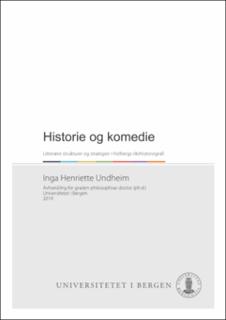| dc.description.abstract | What does it entail to write history as comedy? And what does it entail that the Dano- Norwegian writer Ludvig Holberg (1684-1754) does it? Starting from Hayden White’s metahistorical «Poetics of History», this dissertation investigates how comedy can be said to manifest itself in the form of generic structures and strategies in two of Holberg’s national histories – namely the chapter on Danish history in his debut work Introduction to the History of the Most Prominent European States (1711) and in his major historiographical achievement, the History of Denmark (1732–1735). The investigation has a chronological component in that one work is written before, and the other after Holberg wrote his best-known comedies. This is reflected both in the structure and the readings of the dissertation – in which questions of influence between the genres, development of genre awareness and a sense of form, and, following from this: the development of the specifically «holbergian», are central. With these questions, the theoretical point of departure is also challenged. For even though Holberg wrote histories and comedies interchangeably, it is not a given that the genres influenced each other as White suggests. This is due to two conditions in particular: When White speaks of history as comedy, the term «comedy» represents something quite different than what we associate with Holberg. While Holberg in a Danish-Norwegian context has become emblematic of the strict formalism of classicist aesthetics, White’s definition of comedy is grounded in the literary theorist Northrop Frye’s schematic theories of basic narrative structures, or «archetypes». There is in other words no one-to-one correspondence between Holberg’s and White’s respective understandings of the comedy. The other challenge is the question of time. If White is to be believed, the historians of eighteenth-century Europe were not capable of employing literary strategies and structures creatively in their historical writings. With his view of the eighteenth century as the age of reason, rationalism and Enlightenment, White represents much of what recent Holberg research – this dissertation included – criticises and problematizes. Even though many examples can be found of strictly rationalist Enlightenment historians who, in their disappointment in not being able to realize their absolute requirements of truth in historical writing, resigned in fundamental satire, Holberg is an important reminder of eighteenth-century historians with a more pragmatic relationship both to truth, creativity and historical imagination in the writing of history. | en_US |
